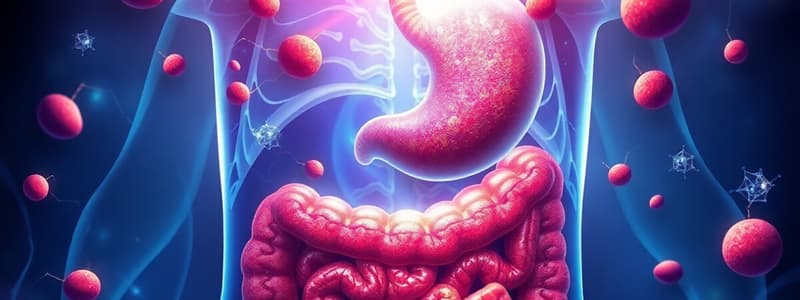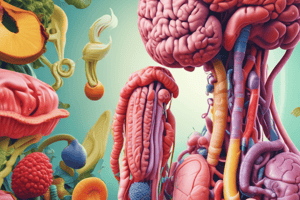Podcast
Questions and Answers
What is the total number of teeth present in a full set of permanent teeth?
What is the total number of teeth present in a full set of permanent teeth?
- 24
- 20
- 28
- 32 (correct)
At what age do milk teeth typically start to appear?
At what age do milk teeth typically start to appear?
- 6 months (correct)
- 5 years
- 3 years
- 1 year
Which of the following types of teeth are absent in milk teeth?
Which of the following types of teeth are absent in milk teeth?
- Canines
- Incisors
- Molars
- Premolars (correct)
What is the primary function of the tongue in the mouth?
What is the primary function of the tongue in the mouth?
What happens to milk teeth after they have served their purpose?
What happens to milk teeth after they have served their purpose?
What are proteins primarily broken down into during digestion?
What are proteins primarily broken down into during digestion?
Which vitamin is produced by the body?
Which vitamin is produced by the body?
Which of the following minerals is essential for hemoglobin creation?
Which of the following minerals is essential for hemoglobin creation?
Which of the following is classified as a macronutrient?
Which of the following is classified as a macronutrient?
What is the primary role of dietary fibers in nutrition?
What is the primary role of dietary fibers in nutrition?
Which nutrient is primarily responsible for providing quick energy to the body?
Which nutrient is primarily responsible for providing quick energy to the body?
What is the main difference in energy production between fats and carbohydrates?
What is the main difference in energy production between fats and carbohydrates?
Which of the following foods is NOT a source of carbohydrates?
Which of the following foods is NOT a source of carbohydrates?
What are the components that make up fats?
What are the components that make up fats?
Which of the following best describes the function of nutrients in the human body?
Which of the following best describes the function of nutrients in the human body?
What is the main function of the uvula in the digestive system?
What is the main function of the uvula in the digestive system?
Which of the following correctly describes the function of peristalsis?
Which of the following correctly describes the function of peristalsis?
What does not occur in the esophagus during the digestive process?
What does not occur in the esophagus during the digestive process?
What is the length of the esophagus in humans?
What is the length of the esophagus in humans?
Which part of the digestive system follows the pharynx?
Which part of the digestive system follows the pharynx?
What is the primary function of mucus in the stomach?
What is the primary function of mucus in the stomach?
How long is the small intestine approximately?
How long is the small intestine approximately?
Which part of the small intestine is responsible for receiving bile and pancreatic juice?
Which part of the small intestine is responsible for receiving bile and pancreatic juice?
What is chyme and how is it formed?
What is chyme and how is it formed?
What is the purpose of villi in the small intestine?
What is the purpose of villi in the small intestine?
What is the primary function of the small intestine in digestion?
What is the primary function of the small intestine in digestion?
Which statement correctly describes assimilation in the context of digestion?
Which statement correctly describes assimilation in the context of digestion?
What is the correct order of the steps in the digestion process?
What is the correct order of the steps in the digestion process?
Which digestive gland is primarily responsible for producing bile?
Which digestive gland is primarily responsible for producing bile?
What distinguishes the large intestine from the small intestine?
What distinguishes the large intestine from the small intestine?
What is the primary function of salivary amylase in the digestive process?
What is the primary function of salivary amylase in the digestive process?
Where does the digestion of food begin in the human body?
Where does the digestion of food begin in the human body?
What structure is responsible for moistening and lubricating food in the mouth?
What structure is responsible for moistening and lubricating food in the mouth?
Which of the following terms refers to the longest part of the alimentary canal?
Which of the following terms refers to the longest part of the alimentary canal?
What is the J-shaped muscular bag that churns food into a fine paste during digestion?
What is the J-shaped muscular bag that churns food into a fine paste during digestion?
What is the main function of incisors?
What is the main function of incisors?
How many types of teeth are present in a human mouth?
How many types of teeth are present in a human mouth?
Which type of teeth are primarily responsible for grinding food?
Which type of teeth are primarily responsible for grinding food?
What term describes the arrangement and number of teeth in the buccal cavity?
What term describes the arrangement and number of teeth in the buccal cavity?
At what age do permanent teeth start to replace milk teeth?
At what age do permanent teeth start to replace milk teeth?
How many total permanent teeth do adults typically have after the age of 18?
How many total permanent teeth do adults typically have after the age of 18?
Which type of tooth is typically absent in milk teeth?
Which type of tooth is typically absent in milk teeth?
What are the four molars that appear after the age of 18 called?
What are the four molars that appear after the age of 18 called?
What is the primary role of saliva in the digestive process?
What is the primary role of saliva in the digestive process?
Which organ is responsible for producing bile juice?
Which organ is responsible for producing bile juice?
What is the approximate length of the large intestine?
What is the approximate length of the large intestine?
Which enzymatic function is NOT associated with pancreatic juice?
Which enzymatic function is NOT associated with pancreatic juice?
What is the diameter of the large intestine approximately?
What is the diameter of the large intestine approximately?
Which part of the large intestine contains the vermiform appendix?
Which part of the large intestine contains the vermiform appendix?
What is the function of the rectum in the digestive system?
What is the function of the rectum in the digestive system?
What type of food does the caecum help digest, particularly in grass-eating mammals?
What type of food does the caecum help digest, particularly in grass-eating mammals?
What role does hydrochloric acid play in digestion?
What role does hydrochloric acid play in digestion?
What is the primary function of bile juice in the duodenum?
What is the primary function of bile juice in the duodenum?
Which enzyme is responsible for hydrolyzing starches in the small intestine?
Which enzyme is responsible for hydrolyzing starches in the small intestine?
How does gastric digestion begin for proteins?
How does gastric digestion begin for proteins?
What is the main role of intestinal juice in the ileum?
What is the main role of intestinal juice in the ileum?
Flashcards are hidden until you start studying
Study Notes
Nutrition & Food
- Nutrients are chemical compounds that nourish the body
- Food contains nutrients
- Carbohydrates are primarily found in sugars, cereals, fruits, and vegetables
- Fats are primarily found in butter, ghee, oils, and animal fats
- Proteins are primarily found in milk, meat, fish, eggs, nuts, and beans
- Vitamins are needed in small amounts and are not produced by the body
- Minerals are needed in small amounts by the body
- Dietary fibers are crucial for bowel movements and preventing constipation
Human Digestive System
- Breaks down food
- Consists of the alimentary canal and digestive glands
- Alimentary canal is a 9-meter long tube that begins at the mouth and ends at the anus
- Digestive glands produce digestive juices and enzymes
Mouth & Buccal Cavity
- First part of the alimentary canal
- Contains teeth, tongue, and salivary glands
- Lips assist in sipping and sucking liquids
- Tongue is a fleshy muscular organ attached to the floor of the mouth
- Tongue contains taste buds
- Tongue pushes food towards teeth
- Tongue helps in swallowing and speaking
- Salivary glands secrete saliva
- Saliva moistens food, keeps the tongue moist, and contains salivary amylase
Pharynx
- Funnel-shaped passage
- Food moves through the esophagus
- Air moves through the larynx and trachea
Esophagus (Foodpipe)
- 25 cm long muscular tube
- Food slides down the esophagus by peristaltic movements
- No digestion occurs in the esophagus
Stomach
- J-shaped muscular bag located below the diaphragm
- Stomach wall contains gastric glands
- Gastric glands secrete hydrochloric acid (HCl), mucus, pepsin, and rennin
- HCl makes the food acidic
- Pepsin digests proteins
- Rennin aids in digesting milk protein
- Mucus protects the stomach lining from HCl
- Stomach stores food for 4-5 hours
- Churns food into a fine pulp called chyme
Small Intestine
- Longer than the large intestine but has a smaller diameter
- Approximately 6.25 meters long
- Consists of three parts: duodenum, jejunum, and ileum
- Duodenum receives bile juice and pancreatic juice
- Jejunum is about 2.5 meters long
- Ileum is the longest part of the small intestine
- The wall has numerous finger-like projections called villi that absorb digested food
Large Intestine
- Approximately 1.5-1.8 meters long
- Wider than the small intestine
- Lies in the abdominal and pelvic cavities
- Consists of the caecum, colon, and rectum
- Caecum is a small pouch with the vermiform appendix
- Colon is divided into the ascending, transverse, descending, and sigmoid colon
- Rectum is a tube that leads to the anus
- The large intestine absorbs water and certain salts
- Converts undigested food to faeces
- Expels faeces from the body through the anus
Digestive Glands
- Salivary glands secrete saliva
- Liver produces bile juice that is stored in the gallbladder
- Pancreas produces pancreatic juice that contains enzymes
Liver
- Largest gland in the body
- Located on the right side of the abdominal cavity
- Weighs approximately 1.5 kg
- Reddish-brown color
- Produces bile juice
Pancreas
- Located in a U-shaped loop of the duodenum
- Pinkish in color
- Produces pancreatic juice that digests sugars, fats, and proteins
Process of Nutrition
- Consists of ingestion, digestion, absorption, assimilation, and egestion
Ingestion
- Intake of food into the alimentary canal
Digestion
- Breaking down complex food into simple soluble molecules
- Begins in the buccal cavity
- Food is chewed and masticated
- Mucus in saliva moistens and lubricates
- Salivary amylase breaks down starch into maltose
- No digestion occurs in the pharynx and esophagus
Digestion in the Stomach
- Gastric juice and hydrochloric acid (HCl) aid in digestion
- HCl activates pepsinogen and prorennin
- Pepsin breaks down protein molecules
- Rennin aids in digesting milk protein
Digestion in the Small Intestine
- Partially digested food (chyme) enters the duodenum
- Bile juice from the gallbladder neutralizes the acidity of chyme
- Pancreatic juice from the pancreas digests fats, sugars, and proteins
- Intestinal juice completes digestion and the intestinal wall absorbs the digested nutrients
Absorption
- Process of taking simple molecules of digested food into the bloodstream
Assimilation
- Utilization of absorbed nutrients by body cells
Egestion
- Removal of undigested food as faeces
Studying That Suits You
Use AI to generate personalized quizzes and flashcards to suit your learning preferences.




